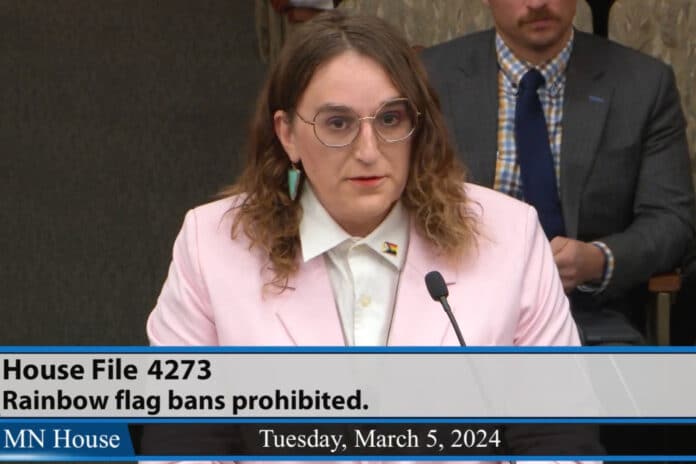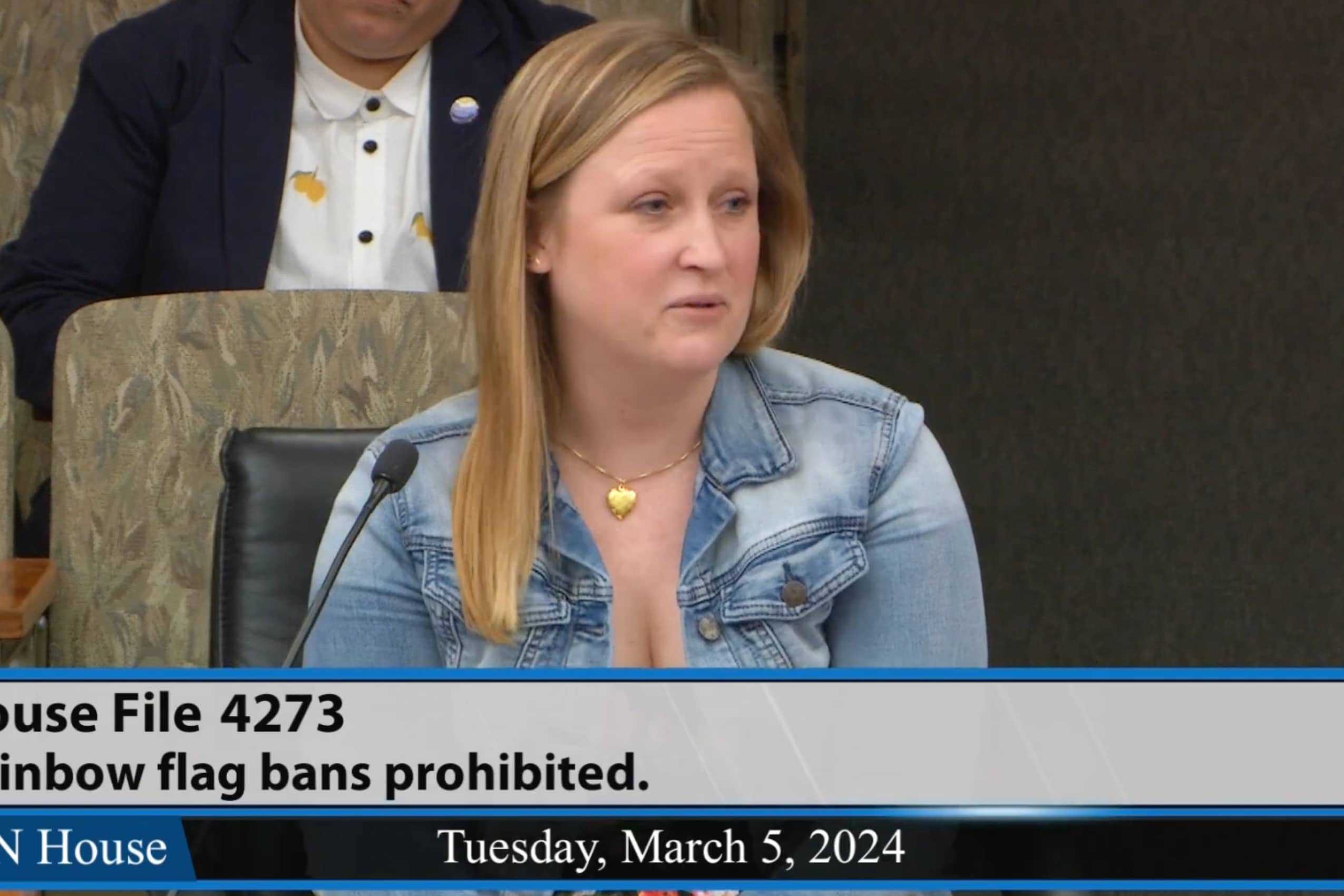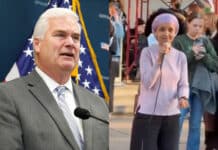
A bill that would prohibit public and charter schools from banning any displays of rainbow flags that teachers or staff post in classrooms is headed to the House floor.
But one Republican lawmaker alleged during a hearing Tuesday that the legislation, HF4273, didn’t receive a proper vetting by an additional committee, which is generally afforded to newly introduced legislation that touches more than one area of government.
On Tuesday, the House State and Local Government Committee voted on a divided voice vote to refer the legislation to the general register. That was after about 20 minutes of public testimony from three LGBTQ advocacy organizations and one first-grade teacher who support the bill, and then a brief discussion among legislators that devolved into an argument between a DFL committee chair and Republican legislator over committee procedure on the legislation.
Rep. Leigh Finke is the chief author of the bill that would prohibit towns, home rule charter and statutory cities, counties, school districts, and any other political subdivision of the state from removing or banning the display of items containing a rainbow. Language of the bill contains an “exception for spaces in which a generally applicable law, rule, or policy prohibits visual displays of any form or content.”
“What this bill says is that if an individual wants to display a rainbow, they can,” said Finke, DFL-St. Paul, who identifies as a trans woman and leads the Minnesota Queer Legislators Caucus.
“More specifically, this bill prohibits a local government from banning a display of rainbow flags, rainbow posters, or rainbow paraphernalia,” Finke continued. “The bill does not require anyone to display rainbows. Nor does it supersede policies that prohibit the display of all banners, flags or posters, etcetera. It just prohibits rainbows from being singled out and banned in schools, libraries and other government spaces.”
One testifier, Nicole Gehler, a first-grade teacher, said she supports the right to display a rainbow flag in her classroom.
“What does a rainbow flag mean to my students and my classroom?” Gehler said. “Here are some words from my first-grade babies:
‘It means my teacher will stand up for me.’
‘It looks like the flags at my house, so I feel home.’
‘It means we are all here together.’
I want every child, family and staff member (in my school) to have a clear visual of inclusion and safety in the community I’ve built.”

Argument over voting procedure, vetting of the bill
Rep. John Koznick, R-Lakeville, expressed concern that many would deem a rainbow flag on display in a classroom or other forums as political speech.
“This bill needs a lot more work because it does infringe on some of those areas that we uphold for education and to be independent of political activities and so I have a lot of concerns here,” Koznick said.
Finke countered by pointing out that the bill’s explicit carveout language says “if you want to ban all expressive posters, flags, stickers, you can do that.”
“What you can’t do is say, ‘We won’t allow rainbows,’” Finke continued. “If you want to say nothing on the walls that might be interpreted as political by anyone, you can fully ban everything. I would hope we wouldn’t do that, but we also know it’s common practice to single out the rainbow.”
Upon the conclusion of discussion, Rep. Ginny Klevorn, DFL-Plymouth, who chairs the committee, made a motion to refer the bill to the general register. While she was asking for committee members to express an “aye” or “nay” voice vote, Koznick interrupted and asked why the bill was not being referred to the House Education Policy Committee.
“This affects schools,” said Koznick, who was then cut off by Klevorn.
“We are in the middle of a vote,” Klevorn said.
“For the record, madame chair, if you would give me some leeway, this is the problem where we are having to fix so many bills this year, because we jam things through,” Koznick said. “We just had a consequential bill moved through yesterday that skipped an important committee.”

Klevorn cut Koznick off again and asked for votes in opposition, even as Koznick continued to make his point.
“Hearing no opposition, the bill is re-referred to the general register,” she said.
Koznick and Rep. Jim Nash, R-Waconia, then asked Klevorn to make a motion to reconsider the vote so those who wanted to voice opposition to the bill could do so.
“This is an easily remedied situation, you can simply take the vote again and because there is opposition to this bill,” Nash said.
Klevorn hesitated to entertain that motion.
“You have the votes to win, this is all we have is to have the discussion and make the point,” Koznick said. “Please don’t be afraid of that.”
“I’m not afraid of anything,” Klevorn said. “So to that point, and to be fair to your members, I will entertain a motion to have a new vote on this bill … But I assure you if this happens again and the rest of this year, I will not be lenient.”
Hank Long
Hank Long is a journalism and communications professional whose writing career includes coverage of the Minnesota legislature, city and county governments and the commercial real estate industry. Hank received his undergraduate degree at the University of Minnesota, where he studied journalism, and his law degree at the University of St. Thomas. The Minnesota native lives in the Twin Cities with his wife and four children. His dream is to be around when the Vikings win the Super Bowl.














